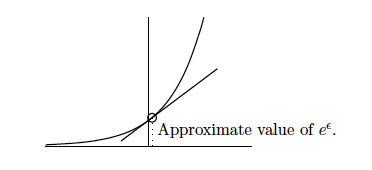March 2010
Euler's formula for ex
We want to prove the identity
 |
(1) |
 , on the left hand side we have
, on the left hand side we have ![\[ e^ x = 1+x+\frac{x^2}{2!}+\frac{x^3}{3!}+\frac{x^4}{4!}+\cdots \]](/MI/53105554fb10232b08eebc4040176ad6/images/img-0003.png) |
![\[ \left( 1+\frac{x}{n}\right)^ n = \sum _{i=0}^ n \frac{n(n-1)\cdots (n-i+1)}{i!}\left(\frac{x}{n}\right)^ i = \sum _{i=0}^ n \frac{x^ i}{i!} \frac{n(n-1)\cdots (n-i+1)}{n^ i}. \]](/MI/53105554fb10232b08eebc4040176ad6/images/img-0004.png) |
 equals
equals ![\[ \frac{1}{i!} \frac{n(n-1)\cdots (n-i+1)}{n^ i} = \frac{1}{i!} \frac{n}{n}\frac{n-1}{n} \cdots \frac{n-i+1}{n}. \]](/MI/53105554fb10232b08eebc4040176ad6/images/img-0006.png) |
 each term here containing
each term here containing  converges to
converges to  giving
giving ![\[ \lim _{n\rightarrow \infty } \left( 1+\frac{x}{n}\right)^ n = \sum _{i=0}^\infty \frac{x^ i}{i!}, \]](/MI/53105554fb10232b08eebc4040176ad6/images/img-0010.png) |
 .
.
You might think this argument has made somewhat cavalier use of limits. The following argument, adapted from [1, pg 272], is close to Euler's original. He was even more bold in his use of limits!
"Euler unhesitatingly accepts the existence of both infinitely small and infinitely large numbers, and uses them to such effect that the modern reader's own hesitation must be tinged with envy." [1, pg 272]

Thinking about  near
near  , and its gradient, we see that, for infinitely small
, and its gradient, we see that, for infinitely small 
![\[ e^\epsilon = 1 + \epsilon \]](/MI/a423b124d2bea449e6eb97f48ae69911/images/img-0004.png) |
 be any given number, then
be any given number, then  is infinitely large. So
is infinitely large. So
Reference
[1] C.H. Edwards, The Historical Development of the Calculus, Springer-Verlag, 1979.